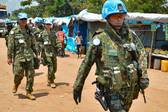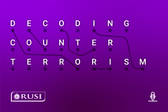The Terrorism and Conflict Studies team utilises evidence-based research that is sensitive to gender and broader conflict considerations to inform policymaking and practices related to conflict assessment and resolution. This includes efforts to ensure counterterrorism measures and initiatives aimed at preventing and countering violent extremism are inclusive and adhere to human rights standards.
The team operates from RUSI’s offices in London, Brussels, and Nairobi. Our multidisciplinary research methodologies are enhanced by our capacity to engage and bring together a broad global network of distinguished experts. We promote policy discussions on current issues and provide recommendations, emphasising that the effectiveness of defence and security policies depends on a comprehensive understanding of the broader conflict ecosystems, which encompass terrorism, developmental needs, and state threats, among other factors.
We aim to:
- Conduct world-class research addressing essential issues related to security ecosystems and the effects of conflict and terrorism.
- Promote international best practices, emphasising our dedication to integrating gender and human rights considerations.
- Build the evidence base for effective monitoring and evaluation approaches.
- Provide capacity building and technical training tailored to a range of regions and countries.
- Increase public understanding by hosting conferences, workshops and meetings.
- Support greater collaboration between public and private sectors.
Our range of ongoing research and implementation projects is focused on helping drive more effective, inclusive and impactful policy and programming to address the ever-shifting landscape of conflict, extremism and terrorism.
Podcast
Listen to our podcast series that explores some of the key concepts in preventative counterterrorism work, drawing on global experience and RUSI research.
Programmes
View the research programmes and projects by the Terrorism and Conflict research team, across their RUSI UK, RUSI Nairobi and RUSI Europe offices and Associate Fellow network.
Conflict Environments and their Violent Influences
This programme aims to better understand the multi-dimensional violent influences that contribute to conflict environments and how to better prevent and counter them.
CT and PCVE Policy and Practice
This programme focuses on improving effectiveness and impact of preventing and countering terrorism and violent extremism policy and practice.
Exploitation of Online Spaces and Emerging Technologies
This programme examines the various ways in which communications and communities are exploited, particularly emphasising the misuse of online platforms and new technologies.
Far Right Extremism and Terrorism (FRET)
We examine the transnational aspects of far-right extremist violence and terrorism, emphasising online interactions, gender roles and the effects on communities.
Stabilisation, Peacebuilding and Integrated Programming
This programme aims to enhance the effectiveness and impact of stabilisation and peacebuilding initiatives while also exploring the advantages of integrated programming methods.
Transnational Jihadist Threats
We assess transnational jihadist threats on a global scale, spanning from Europe to Africa. Our CT/PCVE initiatives inform effective policies and practices for international counterterrorism strategies.
Related topic areas

RUSI’s work offers detailed conflict analysis set against different contexts, and examines conflict prevention, resolution and longer-term recovery.

RUSI’s research addresses climate change as the backdrop to all national security, defence and foreign policy discourses.

Our work addresses the diverse and global nature of threats with research, programming and policy recommendations.

RUSI’s research explores ways to mitigate the risks from cyber attacks and build cyber-resilient societies.

RUSI examines significant issues related to EU foreign and security policy, focusing on the developing relationship with the UK, the war in Ukraine, and other regional conflicts.

We provide in-depth analysis of gender dynamics in foreign and security policy, including a focus on stabilisation, military response, counter-terrorism, and financial and cyber security.

We analyse hostile activities by state actors that fall short of acts of war but seek to destabilise, harm and undermine the UK, its partners and allies.

We examine the evolving global counterterrorist financing landscape and seek to develop appropriate and relevant responses to the threat of terrorist financing.
Our team
Dr Jessica White
Director of Terrorism and Conflict Studies
Terrorism and Conflict
Dr Joana de Deus Pereira
Senior Research Fellow
RUSI Europe
Dr Antonio Giustozzi
Senior Research Fellow
Terrorism and Conflict
Christopher Hockey
Senior Research Fellow
RUSI Nairobi
Michael Jones
Senior Research Fellow
Terrorism and Conflict
Claudia Wallner
Research Fellow
Petra Regeni
Research Analyst and Project Officer
RUSI Europe
Chris Goodenough
Programme Manager
Terrorism and Conflict
Rose Chelangat
Threat Analyst | RUSI Consultant
RUSI Nairobi
Hani Ibrahim
Threat Analyst | RUSI Consultant
RUSI Nairobi
Timothy Kimaiyo
Threat Analyst | RUSI Consultant
RUSI Nairobi
Dennis Okemwa
Threat Analyst | RUSI Consultant
RUSI Nairobi
Latest publications
Access our latest publications and filter by topic, region and by project.
Loading results...
Fellows
Professor Sultan Barakat
RUSI Senior Associate Fellow, Terrorism and Conflict
Jennifer Cole
RUSI Associate Fellow, Terrorism and Conflict
Dr Simon Copeland
RUSI Associate Fellow, Terrorism and Conflict
Dr Stephanie Daher
RUSI Associate Fellow, Terrorism and Conflict
Dr Tom Fisher FRSA
RUSI Associate Fellow, Terrorism and Conflict
Matt Freear
RUSI Associate Fellow, Terrorism and Conflict
Dr Andrew Glazzard OBE
Senior Associate Fellow
Rachel Grimes MBE
RUSI Senior Associate Fellow, Terrorism and Conflict
Adam Hadley CBE
RUSI Senior Associate Fellow, Terrorism and Conflict
Professor Stig Jarle Hansen
RUSI Senior Associate Fellow, Terrorism and Conflict
Air Vice-Marshal (Ret’d) Mike Hart CBE
RUSI Senior Associate Fellow, Terrorism and Conflict
Georgia Holmer
RUSI Senior Associate Fellow, Terrorism and Conflict
Natascha Hryckow
RUSI Associate Fellow, Terrorism and Conflict
Dr Suraj Lakhani
RUSI Associate Fellow, Terrorism and Conflict
Galen Lamphere-Englund
RUSI Associate Fellow, Terrorism and Conflict
Dr Reinoud Leenders
RUSI Associate Fellow, Terrorism and Conflict
Dr Edward Lemon
RUSI Associate Fellow, Terrorism and Conflict
Dr Matthew LeRiche
RUSI Associate Fellow, Terrorism and Conflict
Dr Sarah Marsden
RUSI Associate Fellow, Terrorism and Conflict
Luniya Msuku
RUSI Associate Fellow, Terrorism and Conflict
Theo Murphy
RUSI Associate Fellow, Terrorism and Conflict
Dr Orzala Nemat
RUSI Senior Associate Fellow, Terrorism and Conflict
Professor Peter Neumann
RUSI Senior Associate Fellow, Terrorism and Conflict
Elizabeth Pearson
RUSI Associate Fellow, Terrorism and Conflict
Dr Nicola Pedde
RUSI Senior Associate Fellow, Terrorism and Conflict
Dr Alexandra Phelan
RUSI Associate Fellow, Terrorism and Conflict
Dr Alastair Reed
RUSI Senior Associate Fellow, Terrorism and Conflict
Eric Rosand
RUSI Senior Associate Fellow, Terrorism and Conflict
Dr Gayatri Sahgal
RUSI Associate Fellow, Terrorism and Conflict
Dr Simon Staffell
RUSI Associate Fellow, Terrorism and Conflict
Dr Noah Tucker
RUSI Associate Fellow, Terrorism and Conflict
Isabella Vogel
RUSI Associate Fellow, Terrorism and Conflict
Dr Yaniv Voller
RUSI Associate Fellow, International Security; Terrorism & Conflict
Dr Ian Westerman
RUSI Associate Fellow, Terrorism and Conflict
Dr Tina Wilchen-Christensen
RUSI Associate Fellow, Terrorism and Conflict
Emily Winterbotham
RUSI Senior Associate Fellow, Terrorism and Conflict
Martine Zeuthen
RUSI Associate Fellow, Terrorism and Conflict
Dr Kamil Zwolski
RUSI Senior Associate Fellow, Terrorism and Conflict























































